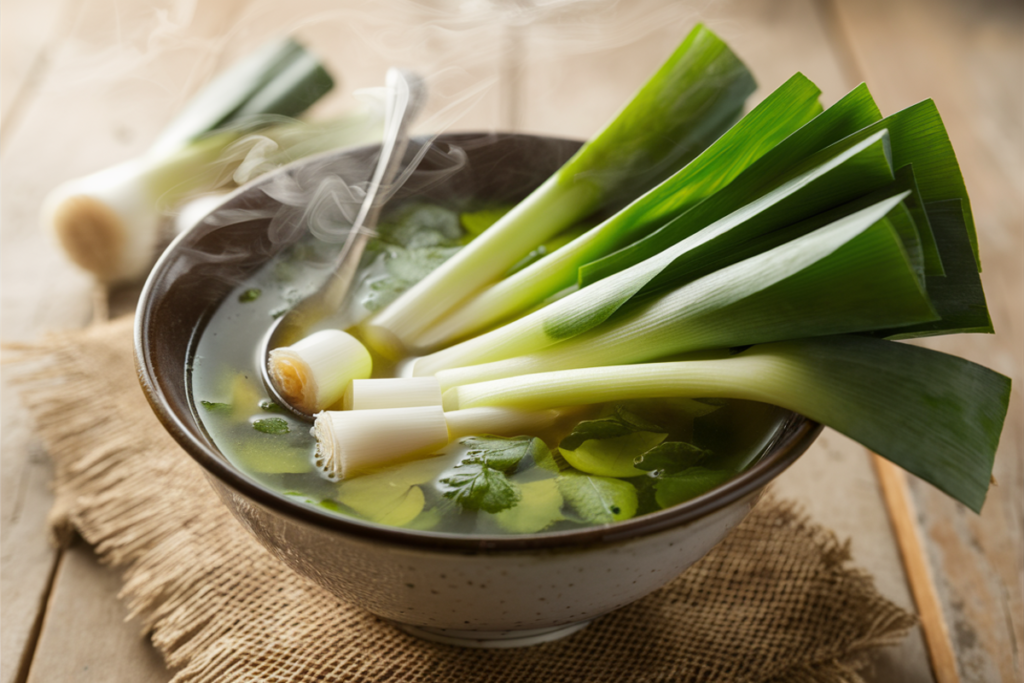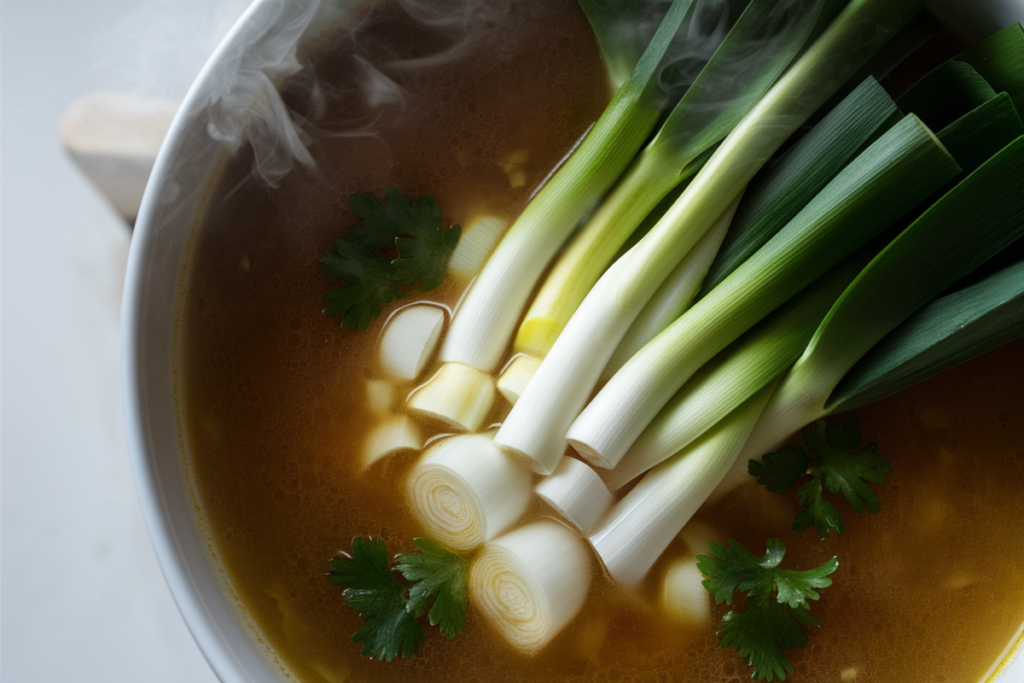Leeks are more than just a mild-flavored vegetable in your soup. What are the benefits of leeks in soup? Beyond their delicate taste, leeks pack a nutritional punch that makes them an essential ingredient for a healthy diet.
In this article, we’ll delve into the nutritional profile of leeks, explore their numerous health benefits, and provide tips on how to incorporate them into your soups. Whether you’re a seasoned cook or a newbie in the kitchen, understanding the benefits of leeks in soup can transform your cooking and health.
Nutritional Profile of Leeks: What Makes Them a Superfood?
Leeks, a member of the allium family alongside onions and garlic, are a powerhouse of essential nutrients. Here’s what makes leeks a superfood:
- Vitamins and Minerals: Leeks are rich in vitamins A, C, and K, folate, and minerals like iron and magnesium. These nutrients contribute to everything from immune support to bone health.
- Phytochemicals: Leeks contain kaempferol, a potent flavonoid with antioxidant properties. This compound helps fight oxidative stress, reduce inflammation, and protect against chronic diseases.
- Low Caloric Content: With only 61 calories per serving, leeks are an excellent addition to soups for those looking to manage their weight without sacrificing flavor or nutrition.
Comparison with Other Alliums
While garlic and onions often steal the spotlight, leeks offer a subtler flavor that pairs well with a variety of dishes, especially soups. Unlike onions, which can overpower a dish, leeks provide a gentle sweetness that enhances rather than dominates.
Heart Health: How Leeks Can Help Keep Your Cardiovascular System in Check
One of the most significant benefits of leeks in soup is their impact on heart health. Here’s how:
- Lowering Blood Pressure: The kaempferol in leeks has been shown to reduce blood pressure, which is crucial for heart health.
- Cholesterol Management: Leeks contain sulfur compounds that can help lower bad cholesterol levels, reducing the risk of heart disease.
- Folate and Heart Health: Folate in leeks helps regulate homocysteine levels, a compound associated with heart attacks and strokes. By incorporating leeks into your soups, you can naturally support your cardiovascular system.
For more insights into heart-healthy ingredients, check out this guide on nutritious salads.
Digestive Health: Why Leeks Are Essential for a Healthy Gut
Leeks are an excellent source of prebiotics, which are crucial for maintaining a healthy gut microbiome. Here’s how leeks in soup can improve your digestive health:
- Promoting Healthy Bacteria: Prebiotics in leeks feed the beneficial bacteria in your gut, which helps improve digestion and nutrient absorption.
- Preventing Bloating and Constipation: The fiber in leeks aids in digestion, helping to prevent common issues like bloating and constipation. By adding leeks to your soup, you’re not only enhancing flavor but also supporting your digestive system.
For more on digestive health, consider this comprehensive guide to cooking healthy foods.
Anti-Cancer Properties: Leeks as a Natural Defense
Leeks contain allyl sulfides, compounds known for their cancer-fighting properties. Here’s why including leeks in soup can be a powerful step towards cancer prevention:
- Protection Against Prostate, Colon, and Stomach Cancers: Studies suggest that the allyl sulfides in leeks may help reduce the risk of these common cancers by inhibiting the growth of cancer cells.
- Antioxidant Effects: The high levels of antioxidants in leeks, including vitamin C and kaempferol, help protect cells from damage that can lead to cancer.
Bone Health: Strengthening Your Skeletal System
Leeks are not just good for your heart and gut; they also support bone health. Here’s how:
- Calcium and Magnesium Content: Leeks provide a good amount of calcium and magnesium, both essential for maintaining strong bones and preventing osteoporosis.
- Vitamin K: This vitamin, also found in leeks, is vital for bone metabolism and the regulation of blood calcium levels.
Weight Loss and Metabolism: How Leeks Can Help You Shed Pounds
If you’re looking to manage your weight, leeks in soup can be your ally. Here’s why:
- Low-Calorie Content: Leeks are low in calories but high in fiber, making them an ideal ingredient for weight loss.
- Boosting Metabolism: The fiber in leeks helps you feel full longer and supports a healthy metabolism, which can aid in weight management.
For more weight-loss tips, explore this recipe for a healthy leek and beef soup.

Immune System Support: Strengthening Your Body’s Defenses
Leeks are packed with nutrients that support a healthy immune system. Here’s how they work:
- Vitamin C: Leeks are a good source of vitamin C, which is crucial for immune function and helps your body fight off infections.
- Antioxidants: The antioxidants in leeks protect your cells from damage, helping to prevent illness and support overall health.
Anti-Inflammatory Benefits: Reducing Chronic Inflammation with Leeks
Chronic inflammation is linked to numerous health problems, including diabetes and arthritis. Here’s how leeks can help:
- Kaempferol’s Role: The kaempferol in leeks has potent anti-inflammatory properties, helping to reduce inflammation throughout the body.
- Polyphenols: These compounds in leeks further contribute to their anti-inflammatory effects, making leeks a great addition to an anti-inflammatory diet.
Cooking Leeks for Soup: Maximizing Flavor and Nutrition
Leeks are a versatile ingredient that can enhance the flavor and nutritional value of your soups. Here’s how to prepare them:
- Cleaning Leeks: Leeks can be gritty, so it’s essential to clean them thoroughly. Trim the roots and dark green tops, and slice the leeks lengthwise. Rinse them under cold water to remove any dirt or sand.
- Slicing: Chop the leeks into thin slices or rings, depending on your recipe.
- Cooking: Leeks can be sautéed, boiled, or added directly to soups. Sautéing them first will bring out their natural sweetness and depth of flavor.
For more detailed tips on preparing leeks, check out our guide on cleaning and preparing leeks.
Leek Soup Recipes: Delicious and Nutritious Options
Here are some popular leek soup recipes to try:
- Leek and Potato Soup: A classic combination, this recipe features leeks and potatoes simmered in a savory broth. It’s creamy and comforting, perfect for a cold day.
- Vichyssoise: A chilled leek and potato soup that is elegant and refreshing, ideal for a summer meal.
For more soup recipes using leeks, visit our recipe guide for leek and beef soup.

FAQs About Leeks and Their Benefits
What Are the Benefits of Eating Leeks?
Eating leeks offers numerous health benefits, including support for heart health, digestive function, and weight management. They are also rich in antioxidants and vitamins that promote overall well-being.
Are There Any Side Effects of Consuming Leeks?
Leeks are generally safe for most people. However, if you have a sensitivity to allium vegetables, you may experience digestive discomfort. Always consult with a healthcare provider if you have concerns about specific food intolerances.
Can I Eat Leeks Raw or Only in Soup?
While leeks are commonly cooked, they can also be eaten raw. Raw leeks have a milder flavor and crunchy texture, making them a great addition to salads and sandwiches.
Conclusion: Embrace the Benefits of Leeks in Soup
Incorporating leeks into your soups not only enhances their flavor but also provides a range of health benefits. From supporting heart health to boosting your immune system, leeks are a valuable addition to a nutritious diet. Experiment with different leek soup recipes and enjoy the many advantages of this remarkable vegetable.
For more recipes and cooking tips, check out our guide on caramelizing leeks and other delicious options on our site.

